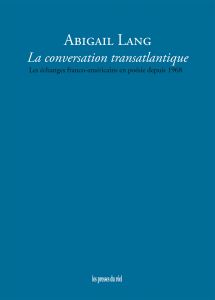
La conversation transatlantique
Les échanges franco-américains en poésie depuis 1968
Publication | Table des matières | Critiques
Résumé
Pourquoi les poètes objectivistes (Reznikoff, Zukofsky, Oppen…) ont-ils bénéficié en France d’une réception sans cesse recommencée depuis cinquante ans ?
Pourquoi tant de poètes français et américains de la même génération se sont-ils lus, cités et entre-traduits dans les années 1980, au point d’établir une communauté transatlantique ?
Table des matières
Introduction
La tradition moderne des deux côtés de l’Atlantique
Préfiguration : l’écriture intransitive de Denis Roche et de John Ashbery
1968
1. La réception perpétuellement recommencée des objectivistes
1.1. Les années 1970 ou le formalisme radical
Serge Fauchereau : « le premier mouvement littéraire délibérément américain »
Le Zukofsky de Jacques Roubaud, antidote au surréalisme et anti-Pound
Les gestes d’Anne-Marie Albiach et de Claude Royet-Journoud
1.2. Les années 1990 et la littéralité
Royaumont, 1989 : la modernité négative rencontre la poésie Language
Le Témoignage de Reznikoff : un modèle pour la seconde littéralité
La Revue de littérature générale : les limites de l’alternative objectiviste
1.3. Vers le XXIe siècle : Testimony comme test de poésie
Jean-Marie Gleize et l’objectivisme français vs. Jacques Roubaud et l’objectivisme radical
Post-poésie : le tournant pragmatique
2. Une communauté de contemporains
2.1. « Ce lien étrange que les livres tissent entre eux »
Le coup de foudre
L’écriture du désastre
Le livre
Le blanc
Le texte entre les livres
2.2. Une communauté à distance
Robert Duncan, figure du passeur
Impression Sun : révélation de la traduction
Première révélation, impression Lucrèce, 1978 : l’élégiaque inverse
Deuxième révélation, impression Sun 1986-1989 : déconnexion des énoncés
Poétique du destinataire : critique de la littérature
Poétique de l’énoncé : critique du discours
La communauté à distance
2.3. Un bureau sur l’Atlantique
21+1 poètes américains d’aujourd’hui « convergences d’idées et d’approche »
Organiser un contexte
West Deck
Faire des tables communes
2.4. La traduction collective à Royaumont
« Partager l’écriture »
Traduire à plusieurs
Littéralités
Bilan
Cauda – « ma mère au téléphone » ou la langue maternelle étrangère de Stacy Doris
3. Le tournant oral
3.1 De la poetry reading à la lecture publique
Renaissance de la poetry reading
Le difficile passage
La lecture publique
3.2. Ton
Vingt poètes américains ou le tournant oral de la poésie américaine
Robert Creeley ou la parole mise en pièce
Dominique Fourcade ou le bas voltage
3.3. Improvisation
Écrit, oral et mental
Forme et performance
Le présent de la composition
Chercher une phrase
Conclusion
Sortir de la modernité
Redéfinir la poésie
Vers une poésie mondiale ?
Critiques
- ‘Literary history is now again, after a longtime hegemony of theory cum philosophy inflected methods, a thriving part of the study of literature. The rise of media studies, the lasting impact of the archival turn as well as the perhaps surprising return of book history (very cool today!) –all exciting side-effects of the digital revolution in art and society– are key factors in this success. Literary history is also all the more exciting since its contemporary forms do not abandon or censor the great debates of the 70s and 80s, when French Theory hit the world. Abigail Lang’s meticulous study of what she calls the “transatlantic conversation” between French and U.S. poets and poetry texts and practices since 1968 is a marvelous example of what literary history is not only representing but also doing today: it is an inspiring mix of textual and archival close-reading, also containing a broad analysis of the thriving forces behind cultural change, an open eye on post-national and plurilingual communication, and last but not least a sharp reflection on what is at stake, both aesthetically and politically, in poetry, that most daring and self-reflexive but also most fragile form of writing and living in our modern times.’ … https://www.leonardo.info/review/2021/02/la-conversation-transatlantique-les-echanges-franco-americains-en-poesie-depuis-1968
-
Reviewed by Jan Baetens, February 2021, Leonardo
- “This important volume from an authoritative international team of authors sheds significant new light on the comparative development of post-war Conservatism in the western world.”
– Stuart Ball, Professor Emeritus, University of Leicester, UK - “The rich essays collected in this illuminating volume show that the rise of right-wing politics in the United Kingdom, the United States, and France since the 1970s was a remarkably transnational phenomenon. As they attacked social democracy and cultural pluralism, right-wing movements borrowed ideas, visions, vocabularies, and tactics from each other, adapting them to their own national idioms and using advances in one country to win advances elsewhere. Anyone interested in confronting the problems that have proliferated in the wake the right’s reconfiguration of politics – surging inequality, belligerent ethno-nationalism, worker disempowerment and insecurity, and lost faith in the capacity for democratic self-government – has much to learn about the origins of these problems from this important book.”
– Joseph A. McCartin, Georgetown University, USA, author of Collision Course
